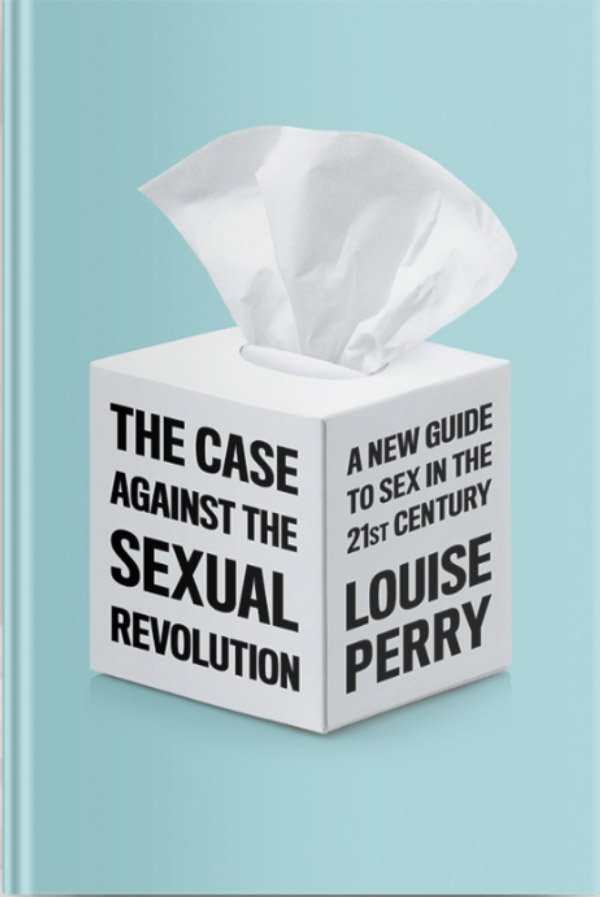Louise Perry is a writer, New Statesman columnist, and campaigner against male sexual violence. Her new book, The Case Against the Sexual Revolution, has sparked an international conversation about sex in the 21st century.
Shermer and Perry discuss:
- What was the sexual revolution?
- feminism: first wave, second wave, third wave, and beyond
- the evolutionary psychology of sex differences
- experiencing self vs. remembered self
- individual freedom vs. societal good
- monogamy vs. polygamy
- marriage vs. domestic partnerships
- Why is the government in the marriage business?
- BDSM and sexual violence
- autogynephilia
- trans matters
- abortion matters
About the Book
Ditching the stuffy hang-ups and benighted sexual traditionalism of the past is an unambiguously positive thing. The sexual revolution has liberated us to enjoy a heady mixture of erotic freedom and personal autonomy. Right?
Wrong, argues Louise Perry in her provocative new book. Although it would be neither possible nor desirable to turn the clock back to a world of pre-60s sexual mores, she argues that the amoral libertinism and callous disenchantment of liberal feminism and our contemporary hypersexualized culture represent more loss than gain. The main winners from a world of rough sex, hook-up culture and ubiquitous porn – where anything goes and only consent matters – are a tiny minority of high-status men, not the women forced to accommodate the excesses of male lust. While dispensing sage advice to the generations paying the price for these excesses, she makes a passionate case for a new sexual culture built around dignity, virtue and restraint.
This counter-cultural polemic from one of the most exciting young voices in contemporary feminism should be read by all men and women uneasy about the mindless orthodoxies of our ultra-liberal era.
David Buss: When Men Behave Badly
- Number of sexual partners preferred
- “Many men are burdened by lust for a variety of different women, constant cravings that cannot ever be fully satisfied … It explains why a handsome movie star such as Hugh Grant would have sex with a prostitute, despite having Elizabeth Hurley, a gorgeous model and actress, as his then steady girlfriend.”
- Length of time before engaging in sex
- Even in the most egalitarian countries, men prefer more sexual partners compared to women. In Norway, researchers asked people how many sex partners they would prefer over the next 30 years. On average, women preferred five, men preferred 25. Even the desire to kiss before intercourse differs between the sexes. About 53 percent of men report that they would have sex without kissing, while only 14.6 percent of women would have sex without kissing.
- Choosiness vs. less discerning
- Studies of online dating, for example, find that most men find most women to be at least somewhat attractive. In contrast, women, on average, view 80% of men as below average in attractiveness. Another study found that on the dating app Tinder, men “liked” more than 60% of the female profiles they viewed, while women “liked” only 4.5% of male profiles.
- Sexual regrets
- Sexual mistakes are viewed differently. Research indicates that when asked to reflect on their sexual history, women are more likely to regret having had sex with someone, while men are more likely to regret having missed out on sexual opportunities.
- What men and women look for in a mate
- For same-sex friends, men and women prioritized personality and social intelligence. For opposite-sex friends, though, men assigned greater value on attractiveness, whereas women placed greater value on economic resources and physical prowess.
- Sexual harassment perceptions
- When men were asked how they would feel if their co-worker of the opposite sex asked them to have sex, 67 percent of men said they would be flattered and only 15 percent said they would be insulted. In contrast, 63 percent of women said they would be insulted and only 17 percent said they would be flattered.
- Back-up mates and cheating
- Why do people cheat on their romantic partners? For men, it appears that the main reason they stray is the desire for sexual variety. In fact, men who cheat are just as happy in their marriages as men who are faithful. In contrast, women who stray are often unhappy. Women who have affairs often want to detach themselves from relationships in which they are unsatisfied and seek a better partner. In fact, only 30 percent of men report falling in love with their affair partners, while for women it is 79 percent.
From Michael Shermer’s The Moral Arc
Consider the morality of the biblical warlords who had no qualms about taking multiple wives, adultery, keeping concubines, and fathering countless children from their many polygamous arrangements. The anthropologist Laura Betzig has put these stories into an evolutionary context by analyzing the Old Testament. She found no less than 41 named polygamists, not one of which was a powerless man. “In the Old Testament, powerful men—patriarchs, judges, and kings—have sex with more wives; they have more sex with other men’s women; they have sex with more concubines, servants, and slaves; and they father many children.” And not just the big names. According to Betzig’s analysis, “men with bigger herds of sheep and goats tend to have sex with more women, then to father more children.” Most of the polygynous patriarchs, judges, and kings had two, three, or four wives with a corresponding number of children, although King David had more than eight wives and twenty children, King Abijah had 14 wives and 38 children, and King Rehoboam had 18 wives (and 60 other women) who bore him no fewer than 88 offspring. But they were all lightweights compared to King Solomon, who married at least 700 women. There were Moabite, Ammonite, Edomite, Sidonian, and Hittite women he married, then for good measure added 300 concubines, which he called “man’s delight.” (What Solomon’s concubines called him was never recorded.)
From Carol Tavris’s reviews of: Nona Willis Aronowitz’s Bad Sex: Truth, Pleasure, and an Unfinished Revolution; Christine Emba’s Rethinking Sex: A Provocation; Louise Perry’s The Case Against the Sexual Revolution. Bridget Phetasy’s in substack essay “Beyond Parody”
After devoting many years to the scientific study of women’s heterosexual experiences—through reading, observing, listening, and participating—I have drawn a few conclusions:
- Many women like sex when it brings erotic pleasure and they like the guy. This is called “good sex.”
- Many women don’t like sex when the guy is a dork, rude, thoughtless, clumsy, coercive, or violent. This is called “bad sex.”
- Many women enjoy hookups, short affairs, conference connections, orgies (planned and spontaneous), and adventures with multiples and variations of all kinds. This is called “having fun.”
- Many #3 women get tired after a few years (“Oh God, Murray, another orgy?”), whereas others make it a way of life. This is called “being in the lifestyle.”
- Many women prefer sex with one doting partner at a time, the “time” lasting from as long as love does, from a week to a lifetime. This is called “a loving relationship.”
In every era, there are people who devote their energies to telling women they’re doing it all wrong. Are you enjoying monogamy with your sweetheart when others all around you are claiming that it is liberating, feminist, and “sex positive” to have many partners? Are you hopelessly straight or gay, or a hopelessly old-fashioned one-partner-at-a-time person, even though you think that for political, personal, or progressive reasons you really ought to be trying the alternatives? Are you enjoying your many affairs when others all around you are claiming that women aren’t designed for infidelity, that you’re merely capitulating to the Playboy standard, that you’re repressing the trauma of all those impersonal adventures, that you’re just a dupe and victim of hardwired male sexual preferences? Like a call-and-response in music or church, whichever view is ascendant will call for its inevitable antithetical response. Sex writers are always pouncing on a new hook, even when today’s new is yesterday’s old.
Today’s hook is this: if it’s good to be sex-positive, how come so many women are having sex-negative experiences? Why so much unwanted sex, harassments, miserable hookups, drunken episodes? Why the eternal difficulties in communication? Why do many women feel obliged to “consent,” when they’d rather go home and play with the dog? A spate of recent books locates the answers in the failure of feminism and the “unfinished” sexual revolution to make women’s sexual lives a thing of beauty and a joy forever.
To her credit, Nona Willis Aronowitz does not write an analysis of women’s continuing search for sexual ecstasy, satisfaction, and thoughtful male partners as if no one had done so before. That would have been a challenge, given that her own mother, the brilliant feminist Ellen Willis, tackled these questions a generation earlier, and her daughter interweaves her mother’s writings and experiences, along with those of other feminists of that era, with her own stories. But whereas her mother’s generation (and mine) emphasized that the personal is political, Willis Aronowitz’s mantra is the political is personal.
Personal? TMI is an understatement. Indeed, readers may forgiven for asking, What bad sex? The book is a litany of the many orgasms she’s had, hours and hours of cunnilingus with this lover and that one, anal oral sideways multiples, the fantastic lovers, the terrible lovers, how she loves dick, experiments with other women, passionate weekends. The “bad sex” of the title is mostly “bad relationships”—hookups with men who were selfish or otherwise unlikeable, or, in the case of the partner she leaves at the outset of her story, relationships that had become sexually boring. Here it all is again, yet another woman trying to find the blissful balance between committed sex and casual sex—open relationships being necessary for anyone who believes that monogamy is death to being a fully sexually liberated person. Calling Dr. Ester Perel and the innumerable marriage counselors who study the shapeshifting patterns of intimacy, passion, and desire over the course of life and love.
As I read this book, I wondered how the same narrative would sound if written by a man:
“I left my otherwise loving partner, whom I loved, because I got bored with her and our sex life, and I didn’t like her off-putting smell that ruined our sexual chemistry. I’m happy to report other intimate details about her that annoyed me, but I won’t bother you with her perspective on me. I will tell you about my many lovers so you will understand how desirable I am, including that amazing afternoon in which I received one blow job after another. I confess that certain body shapes and sizes turn me on. Unfortunately, along with the hot women I couldn’t get enough of, at least until I tired of them, I hooked up with some awful women too—demanding, rude, noncommunicative about their desires, egocentric. Wait: one of those impersonal hookups was a very nice person.”
If you enjoy the podcast, please show your support by making a $5 or $10 monthly donation.
This episode was released on December 24, 2022.










